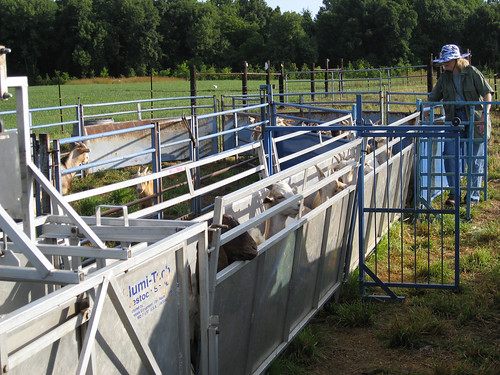Upon arrival, the goats will be unloaded into a handling system with a work platform (Billy Buster). They will stand in a foot bath of zinc sulfate for 10 minutes. They will be weighed. The first 13 days of the test will serve as an adjustment period. Growth rates will be calculated from the weights taken on June 20.
 Fecal samples will be collected from each goat. After close inspection, the goats will be dewormed with Cydectin® 1% injectable (1 ml/110 lbs.) and Prohibit® drench (3 ml/50 lb.). Anthelmintics from two chemical classes are being administered to make sure all of the goats start the test equally with regards to internal parasitism.
Fecal samples will be collected from each goat. After close inspection, the goats will be dewormed with Cydectin® 1% injectable (1 ml/110 lbs.) and Prohibit® drench (3 ml/50 lb.). Anthelmintics from two chemical classes are being administered to make sure all of the goats start the test equally with regards to internal parasitism.Fecal samples will be analyzed by Dr. Dahlia Jackson at Delaware State University (Dover, DE) using the modified McMaster technique. A pooled sample will be sent to the University of Georgia to determine worm species present. Fecal egg counts do not differentiate between stomach worm types. The eggs need to be hatched into larvae for accurate identification.
Body condition and FAMACHA© scores will be recorded for each goat. A scrotal measurement will be taken using a scrotal tape. For the first several days of the test, the goats will be treated for coccidioisis (in the water).
It has been a cool, wet spring. The pasture is waist to chest high. It is composed mostly of orchardgrass. Two acres of pearl millet was recently planted. The chicory is growing well.
A field day and sale will be held on Saturday, October 4, at the Washington County Agricultural Center in Boonsboro, MD (an adjacent propery).This is the third year of the Western Maryland Pasture-Based Meat Goat Performance Test. It is sponsored by University of Maryland Extension.











